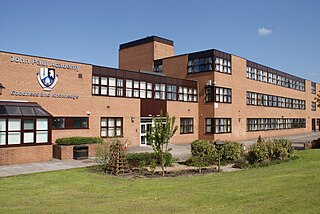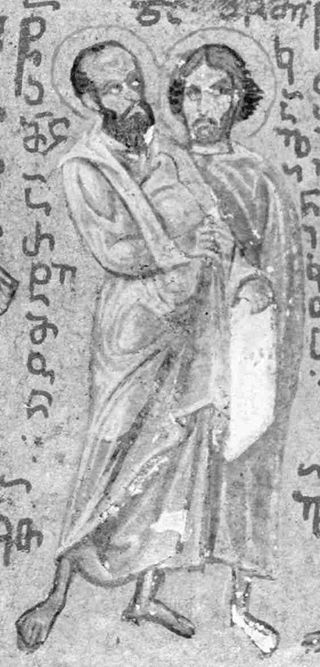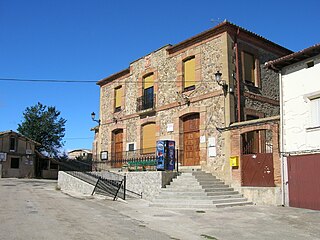Related Research Articles

Pope Cornelius was the bishop of Rome from 6th or 13 March 251 until his martyrdom in June 253. He was pope during and following a period of persecution of the church, while a schism occurred over how repentant church members who had practiced pagan sacrifices to protect themselves could be readmitted to the church. He agreed with Cyprian of Carthage that those who had lapsed could be restored to communion after varying forms of Reinitiation and Penance. This position was in contrast to the Novatianists, who held that those who failed to maintain their confession of faith under persecution would not be received again into communion with the church. This resulted in a short-lived schism in the Church of Rome that spread as each side sought to gather support. Cornelius held a synod that confirmed his election and excommunicated Novatian, but the controversy regarding lapsed members continued for years.
Æthelwold of Lindisfarne was Bishop of Lindisfarne from 721 until 740.

John Paul Academy, is a Roman Catholic secondary school in Summerston, Glasgow, Scotland. It mainly serves Summerston, Maryhill, Ruchill, Possilpark and Milton and has a capacity of 800–1000 pupils. The catchment area for the school changed after the 1990s; the areas of Ruchill, Possilpark and Milton were provided by St Augustine's Roman Catholic Secondary School within Milton area, and the children of Catholic families of Bearsden and Milngavie went to John Paul Academy.

Symbolism of Christian saints has been used from the very beginnings of the religion. Each saint is said to have led an exemplary life and symbols have been used to tell these stories throughout the history of the Church. A number of Christian saints are traditionally represented by a symbol or iconic motif associated with their life, termed an attribute or emblem, in order to identify them. The study of these forms part of iconography in art history. They were particularly used so that the illiterate could recognize a scene, and to give each of the Saints something of a personality in art. They are often carried in the hand by the Saint.

According to Eastern Orthodox traditions, according to the Commentary on the Apocalypse of Andreas of Caesarea, it is believed that Saint Antipas was the Antipas referred to in Revelation 2:13, as the verse says: "I know thy works, and where thou dwellest, even where Satan's seat is: and thou holdest fast my name, and hast not denied my faith, even in those days wherein Antipas was my faithful martyr, who was slain among you, where Satan dwelleth." According to Christian tradition, John the Apostle ordained Antipas as bishop of Pergamon during the reign of the Roman emperor Nero. The traditional accounts go on to say Antipas was martyred during the reign of Nero (54-68) or Domitian, by burning in a brazen bull-shaped altar for casting out demons worshipped by the local population.
Ælfthryth, also known as Alfreda,Alfritha, Aelfnryth, or Etheldritha, is a Mercian princess, saint, virgin, and recluse, venerated in both the Catholic Church and Antiochian Orthodox Church. She was a daughter of King Offa of Mercia and his consort, Cynethryth.
Flannán mac Toirrdelbaig was an Irish saint who lived in the 7th century and was the son of an Irish chieftain, Toirdhealbhach of Dál gCais. He entered Mo Lua's monastery at Killaloe, where it is believed he became an Abbot. He is remembered as a great preacher. He made a pilgrimage to Rome where Pope John IV consecrated him as the first Bishop of Killaloe, of which he is the Patron Saint. He also preached in the Hebrides. His feast day is 18 December.

Artemas of Lystra was an early Christian saint, who is mentioned in the New Testament. He is mentioned in Paul's Epistle to Titus. He is believed to have served as the Bishop of Lystra, and to have been one of the Seventy Disciples. He is a saint in the Eastern Orthodox Church and Roman Catholic Church.

The Eparchy of Saint Vladimir the Great of Paris is an eparchy of the Ukrainian Greek Catholic Church, a sui iuris church of the Roman Catholic Church. Its territory encompasses France, Belgium, Luxemburg, the Netherlands and Switzerland.

Saints Victor and Corona are two Christian martyrs. Victor was a Roman soldier who was tortured and killed; Corona was killed for comforting him. Corona is invoked as a patron of causes involving money; she was not historically associated with pandemics or disease, but has been invoked against the coronavirus pandemic.
Abadiu of Antinoe was a bishop of Antinoe in the Fourth Century. He is commemorated as a saint in the Coptic Orthodox Church, and is said to have been killed in a theological dispute with the Arians. His feast day is 26 December. He is referenced in Les Martyrs d'Égypte by Hippolyte Delehaye.

Viloria de Rioja is a municipality located in the province of Burgos, Castile and León, Spain. According to the 2014 census (INE), the municipality has a population of 41 inhabitants. It was the birthplace of Saint Dominic de la Calzada, in 1019.

Rais, also known as Iris, Iraida, Irais, Herais or Rhais, is a martyr venerated by the Roman Catholic and the Eastern Orthodox churches. According to one account, she was the daughter of a Christian priest named Peter living in Alexandria, Roman Province of Egypt. At the age of twelve, she was sent to live in a women's monastery at Tamman. One day in 303 AD, during a time of widespread persecution of Christians during the reign of the Roman Emperor Diocletian, she went to a well to draw water with other nuns. On the way, they saw a ship with a group of nuns, monks, and other Christians in chains, who were being abused by Loukianos and his men. Rais berated the abusers and insisted that they kill her as well if they were killing Christians. They took her into custody. When the ship had reached Antinoöpolis, Rais was one of the first to die. When Loukianos yelled out, "I spit upon the Christian God," Rais objected, stepped up and spat into the tyrant's face. Loukianos then ordered the girl to be tortured and beheaded.
Zacchaeus of Jerusalem, also known as Zacharias, was a 2nd-century Christian saint venerated by the Roman Catholic and Eastern Orthodox churches. He was the fourth Bishop of Jerusalem. His feast day is August 23.
Liberata and Faustina of Como were sisters who lived as holy virgins in Como, Italy, during the 6th century. They founded the Convent of Santa Margarita in the town, and both died around 580 AD.
A positio is a document or collection of documents used in the process by which a Catholic person is declared Venerable, the second of four steps on the path to canonization as a saint.

Bercthun of Beverley also known as Bertin, Britwin, Berhthu and Beorhthun, was an eighth century Anglo-Saxon saint.
The Bishop of Ramsbury was an episcopal title used by medieval English-Catholic diocesan bishops in the Anglo-Saxon English church. The title takes its name from the village of Ramsbury in Wiltshire, and was first used in the 10th and 11th centuries by the Anglo-Saxon Bishops of Ramsbury. In Saxon times, Ramsbury was an important location for the Church, and several early bishops became Archbishops of Canterbury.
Prymnessus or Prymnessos, or Prymnesus or Prymnesos (Πρύμνησος), or Prymnesia (Πρυμνησία) was a town of ancient Phrygia. Its site is located near Sülün in Asiatic Turkey.
References
- ↑ Online, Catholic. "St. Herculanils - Saints & Angels". Catholic Online. Retrieved 2022-11-27.